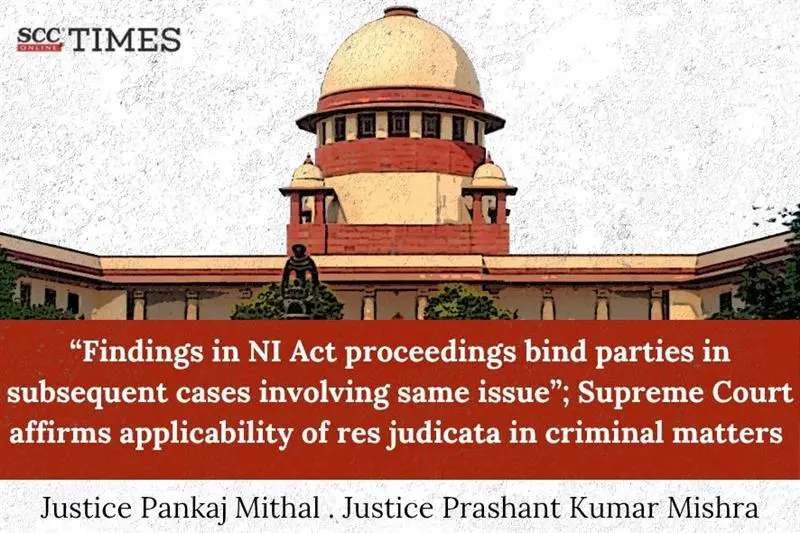Supreme Court: In a criminal appeal against the judgment of the Allahabad High Court, wherein the petitioner’s application under Section 482 of the Criminal Procedure Code, 1973, seeking quashing of criminal proceedings pending before the Chief Judicial Magistrate for offences under Section 420 of the Indian Penal Code, 1860, was dismissed, the division bench comprising of Pankaj Mithal and Prashant Kumar Mishra*. JJ. allowed the appeal. The Court held that a person cannot maintain a prosecution based on allegations that had already been raised as his defence in earlier proceedings where he was the accused. It further observed that the business relationship existed solely between the two companies involved, with cheques and demand drafts exchanged from one company to the other, and no payment made by the complainant partner to the accused in his personal capacity. Thus, the Court held that the present case warranted the quashing of the criminal proceedings instituted against the accused.
Background
The accused, Managing Director of Ruchira Papers Ltd. filed a complaint under Section 138 of the Negotiable Instruments Act against ID Packaging and its partner after seven out of eleven cheques issued between December 1997 and January 1998 were dishonored. The partner’s defense, that the liability had already been settled through demand drafts was rejected by the Magistrate, who convicted him and imposed a fine equivalent to the cheque amount. The conviction and sentence were upheld in appeal. Subsequently, during the pendency of a criminal revision, the sentence was suspended upon deposit of the fine amount, and the High Court disposed of the revision and related proceedings based on a compromise between the parties.
While proceedings under Section 138 of the NI Act were ongoing, the accused had also filed a civil suit for recovery based on the seven dishonoured cheques, which ended in an ex-parte decree and was later settled after the partner paid Rs. 3,20,385/-. During the pendency of the NI Act case, the partner filed an application under Section 156(3) CrPC, alleging that the accused had fraudulently re-presented the cheques despite having received payment through demand drafts. This led to the registration of FIR of 1998 against the accused, though the company was not named as an accused. A chargesheet was filed against the accused and another individual, excluding the company, and the Magistrate took cognizance and summoned the accused on 19-06-2002. The accused’s petition under Section 482 CrPC seeking quashing of the chargesheet and summoning order was dismissed by the High Court. Thus, the present appeal was filed.
Analysis and Decision
The Court noted that in the Section 138 NI Act proceedings, the partner had specifically argued that there was no outstanding debt related to the seven dishonoured cheques, claiming the amount had already been paid through separate demand drafts. However, the Magistrate, in the order dated 25-10-2002, rejected this defence, noting that the partner never requested the complainant company to return the cheques when the alleged payments were made.
Thus, the Court highlighted that the findings recorded by the jurisdictional criminal court in the Section 138 NI Act proceedings would be binding on both parties in any subsequent proceedings involving the same issue.
The Court noted that the question of the applicability of the principle of res judicata in criminal proceedings has been considered in several of its earlier decisions. Given the divergence of opinion, the Court deemed it necessary to conduct a deeper examination and review the law laid down in those precedents.
The Court clarified that when reading the three earlier decisions alongside the two later ones, there is no inconsistency in the application of the principle of res judicata. The earlier decisions in Pritam Singh v. State of Punjab, 1955 SCC OnLine SC 20; Bhagat Ram v. State of Rajasthan, (1972) 2 SCC 466; The State of Rajasthan v. Tarachand Jain, (1974) 3 SCC 72 wherein , it was held that the principle that the principle of res judicata is equally applicable in criminal matters, were based on prior acquittals following full trials, whereas the later cases Devendra v. State of Uttar Pradesh (2009) 7 SCC 495 and Muskan Enterprises v. The State of Punjab, (2024) INSC 1046, wherein it was held that principle of res judicata has no application in a criminal matter. were decided at the preliminary stage of quashing petitions under Section 482 CrPC, without any final adjudication on merits. In Devendra (supra), the first petition challenged the FIR, while the second was filed after cognizance was taken. In Muskan Enterprises (supra), the first petition was withdrawn without liberty, making the second one non-maintainable. Therefore, the Court held that these later decisions are clearly distinguishable and do not indicate any divergence in the application of res judicata.
In addition, the Court clarified that Pritam Singh (supra) was decided by a three-judge Bench, whereas all subsequent decisions were rendered by two-judge Benches. Therefore, Pritam Singh holds binding authority on the issue of the applicability of the principle of res judicata in criminal proceedings.
Thus, the Court concluded that the partner cannot maintain a prosecution based on allegations that had already been raised as his defence in the earlier proceedings where he was the accused. Accordingly, the present criminal proceedings merit quashing on this ground alone.
The Court further noted that the business relationship existed between the two companies. The cheques and demand drafts were issued from one company to the other, and no payment was made by the partner to the accused in his individual capacity.
After referring to Sharad Kumar Sanghi v. Sangita Rane, (2015) 12 SCC 781 and Delhi Race Club (1940) Ltd. v. State of Uttar Pradesh, wherein it was held that a person cannot be vicariously prosecuted, especially for offences under the IPC, merely on account of the fact that he holds a managerial position in a company without there being specific allegations regarding his involvement in the offence.
Thus, the Court held that the present case warrants the quashing of the criminal proceedings instituted against the accused for offences under Section 420 of the IPC.
CASE DETAILS
|
Citation: Appellants : Respondents : |
Advocates who appeared in this case For Petitioner(s): For Respondent(s): |
CORAM :










